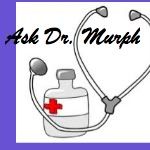
Through college and every now and then I have asked my sorority sister/brilliant doctor friend random questions about health and fitness from a medical point of view rather than typical blog and magazine suggestions. Dr. Murph is a great sport and agreed to let me publish her answers to my most recent random questions.
Have questions for Dr. Murph? Let me know! Let's keep this series going!
First, her disclaimer:
Okay, on to the questions!
- Will taking Vitamin D in the winter prevent winter blues?
Unfortunately, this will probably not help. Many studies show that depressed people are more likely to have low levels of Vitamin D, but whenever they try to give people vitamin D for depression, it doesn't work. Association does not mean causation. It makes sense to me that the depression comes first, which results in people staying in and getting less sunlight, which is your primary source of Vitamin D, so then your levels are low. The same thing comes to mind with the studies that associate higher Vitamin D levels with healthy body weight - The running around outside probably came first, eh? One thing is for sure: Vitamin D is essential for the absorption and metabolism of calcium and phosphorus, which have many important functions in the body, especially maintaining healthy bones (We'll get to this later.) When its sunny, most young healthy people get enough Vitamin D to get by, but Ohio isn't exactly sunny for a good portion of the year, so I do think its a good thing to have in your multivitamin. The most common recommendation is at least 800 IU per day.
2. I take Calcium because women are supposed to. Right?!?!
Yes, you're supposed to! To prevent osteoporosis.. a potentially debilitating disease, as well as a major obstacle to living well into your 80s, 90s, 100s. A women only has until age 30 to build her peak bone mass. From there, we start to lose bone at a slightly faster rate than we can build it. Finally at menopause, without the support of estrogen, bone mass really starts to decline. After your peak at age 30, you will end up losing half of your trabecular bone mass (think inside spongy bone) and 30% of your cortical bone (think hard outside shell). So make that peak as high as you can! And keep taking your Calcium and Vitamin D to keep the decline as slow as you can. Other risk factors for osteoporosis include white race, smoking, low BMI, lack of exercise, and steroid medications. Try to get 1,200mg per day and bump it up to 1,500/day at menopause. Dietary Calcium is great, but I have found that many of us need to supplement if we are trying to watch our calories as well. (If only this gave us permission for unlimited cheese, milk, yogurt, and ice cream yumm)! Calcium supplements come as calcium carbonate, calcium phosphate, or calcium citrate. On the bottle there will be a milligram of the tablet, but what you care about is the milligrams of elemental calcium to meet your daily goal. If you want to be really obsessive about it, Calcium can also be tough for your body to absorb all at one time, so separating out doses can help. Calcium carbonate needs food to absorb but most supplements are calcium citrate now, and those can be taken without food. As an OB/GYN I beg you, take your calcium. Osteoporosis sucks.
3. I take B Complex because I was told it helps with digestion...oh and P.S. why does it make my urine the color of yellow gatorade?!?!
lol - I'm not sure If I've heard this one before! I was wondering what you might ask about B complex vitamins because they seem to be touted as a cure for pretty much anything and everything. B vitamins are important for countless biochemical processes in the body, but overall I'm not sure if there is convincing evidence for supplementation.
- Fat-soluble vitamins - surplus stored in the liver, extremely high doses can cause toxicity - A, D, E, & K
- Water-soluble vitamins - not stored in the body, kidney simply excretes the extra - such as B vitamins and vitamin C, and others.
4. I take Vitamin C for my immune system. I started to take it every day when I moved to Chicago and haven't been sick yet! Yay!
More tomorrow!!

1 comment:
sheesh, mare! how many vitamins do you take?! :) haha, love this!
Post a Comment